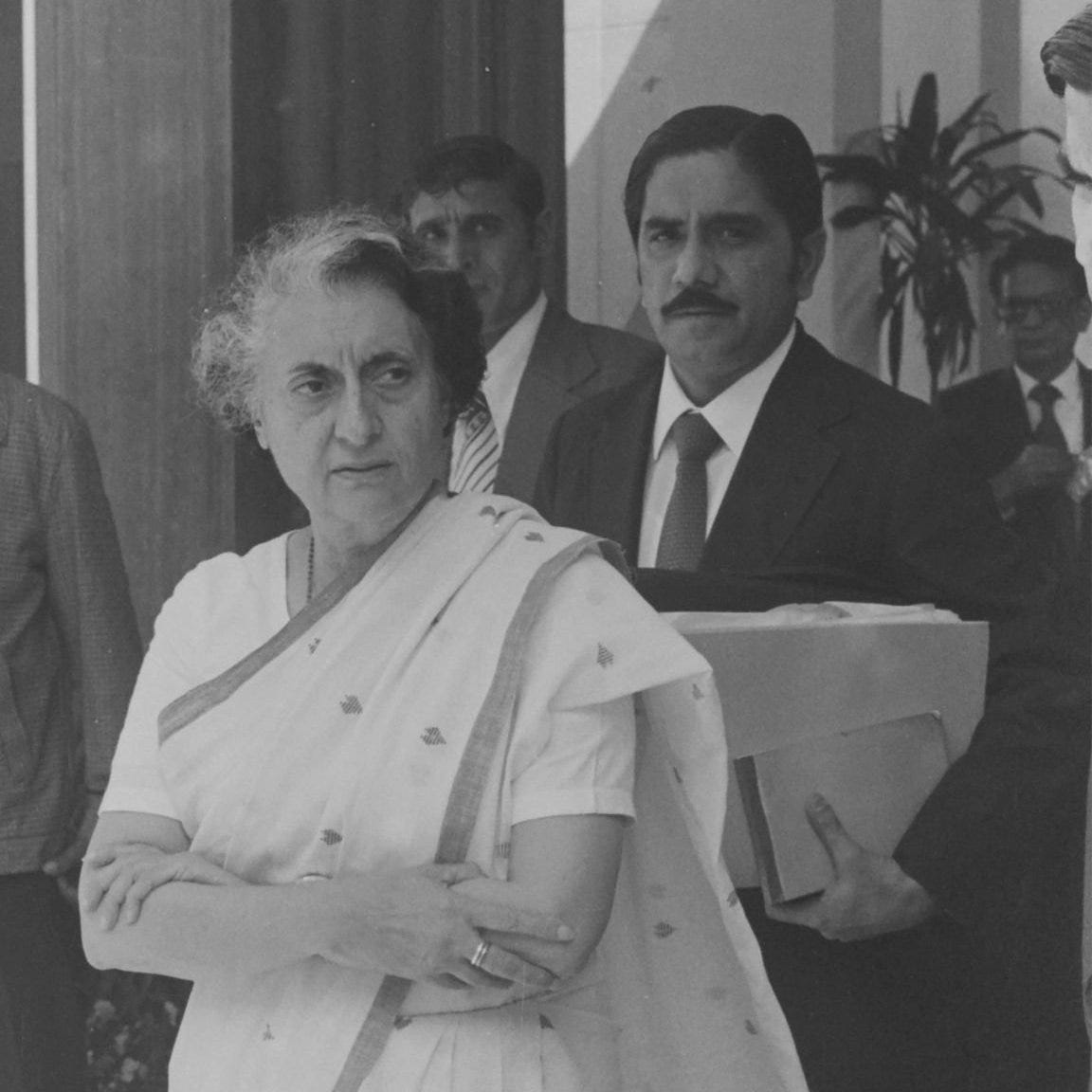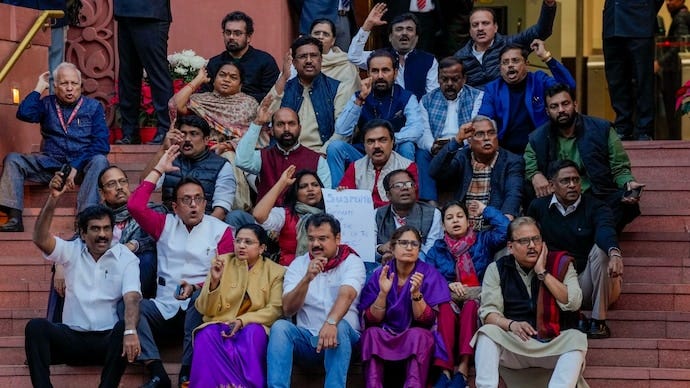Hey Buddy, Glad to see you again! Welcome to Tuesday, 19th December 2023’s Matters that Matter.
78 Opposition MPs -33 from Lok Sabha and 45 from Rajya Sabha - were suspended from Parliament for ‘unruly’ behavior on Monday - the highest suspensions in a day. With 14 opposition MPs (13 from Lok Sabha and one from Rajya Sabha) suspended last week, a total of 92 MPs have now been suspended in this session.
Till now, the highest number of MPs suspended in a single day was on March 15, 1989, when 63 Opposition members were suspended from Lok Sabha.
The 1989 action
On March 15, 1989, there was an uproar in the Lok Sabha after the tabling of the report of Justice Thakkar Commission of inquiry into the assassination of Prime Minister Indira Gandhi in 1984.
The Thakkar probe panel cast doubts on the role of R K Dhawan, Indira Gandhi's special assistant, in the conspiracy to assassinate her. The Opposition staged protests as Dhawan was also part of PM Rajiv's team. Dhawan later joined the Congress and rose to the rank of its national general secretary.
As many as 63 MPs were suspended in one go for "unruly conduct" for the remainder of the week, meaning three days.
In the current scenario, however, the members have been suspended for the rest of the session. Almost 12% of the combined strength of Parliament, and 39% of MPs in the INDI alliance, are now suspended.
"All democratic norms are being thrown into the dustbin by an autocratic Modi," Congress President Mallikarjun Kharge posted on X. Congress leader Jairam Ramesh, himself suspended from Rajya Sabha, said the suspensions were "the murder of democracy".
Piyush Goyal, Leader of the House in Rajya Sabha, retorted: "The rude behavior of the Congress and its friendly partners ...has embarrassed the entire country. Both the Speaker and the Chairman were insulted today."
Why were the MPs suspended?
The MPs in both Houses were suspended for disrupting Parliamentary proceedings while protesting last week's Parliament security breach on December 13.
The opposition members have been demanding a statement from Union Home Minister Amit Shah, followed by a discussion. Some MPs have also sought Shah's resignation and the presence of Prime Minister Narendra Modi inside Parliament to issue a statement.
The MPs waved placards with their demands. Three- K Jayakumar, Vijay Vasanth and Abdul Khaleque, all from the Congress -climbed onto the Speaker's podium.
In Rajya Sabha, the Opposition raised slogans on the Parliament breach and disrupted proceedings.
Why do MPs disrupt Parliament?
There is an old tradition, irrespective of which party or alliance is in opposition, of MPs causing a ruckus inside Parliament. Over the years, four broad reasons have been identified for disorder in legislatures:
the lack of time available to MPs for raising important matters
the unresponsive attitude of the government and retaliatory posture by Treasury benches
deliberate disruption by parties for political or publicity purposes, and
the absence of prompt action against MPs disrupting Parliamentary proceedings.
Over the decades, the say the Opposition has in deciding the Parliamentary calendar has been reducing. Not only does the Government set the agenda in Parliament and decide how much time will be dedicated to any issue, Parliamentary procedure also prioritizes government business over other matters.
Parliament has not updated its rules in this regard over the last 70 years.
All parties have disrupted Parliament - and their view on disruptions have been determined almost always by whether they are in power or not.
So, who can suspend the MPs? How?
The Presiding Officer- Speaker of LS and Chairman of RS- plays the major role in meting out suspensions. The procedure in both Houses is largely similar.
First, the presiding officers can direct an MP to withdraw from the House for any disorderly conduct. If that does not work and the said MP continues to disrupt the House proceedings, the presiding officer can "name" the legislator. After that, the House can move a motion to suspend the MP until the end of the session.
While these rules have mostly remained unchanged since 1952, in 2001, the Lok Sabha further empowered the Speaker to deal with "grave and disorderly conduct." As per the new rule, an MP"named" by the Speaker shall automatically stand suspended for five days or the remaining part of the session. This rule removes the need for the House to pass a motion for suspension. Notably, the Rajya Sabha has not included this provision in its procedures.
How long can MPs be suspended for?
Mild offenses are punished by admonition or reprimand, with the latter being the more serious of the two punishments. After this comes the punishment of "withdrawal" where the MP has to remain absent during the remainder of the day's sitting. However, continuing to disregard the Presiding Officer's directions can invite the punishment of suspension. A member can be suspended, at the maximum, for the remainder of the session only. Moreover, the House, at any point in time, can reinstate a suspended member by passing a motion. In cases of extreme misconduct, the House may expel a member "to rid the House of persons who are unfit for membership."
Is suspending MPs common practice?
While it is a strong step, it is not uncommon. However, the number of suspensions have gone up over the last few years. At least 149 suspensions have been meted out, both Houses included, since 2019, compared with at least 81 in 2014-19, and at least 36 in 2009-14.
This has been an often-debated issue, however, with Presiding Officers attempting to find ways to address it.
"In most cases, disorders in the House arise out of a sense of frustration felt by members due to lack of opportunities to make his point. They are perhaps easier to deal with," Former President K R Narayanan, who chaired Rajya Sabha from 1992-97, said in a 1992 conference. "What is more difficult to tackle is planned parliamentary offenses and deliberate disturbances for publicity or political motives," he said.
In many ways, it falls on the Presiding Officer to maintain a crucial balance in the House. "While enforcement of the supreme authority of the Speaker is essential for smooth conduct of proceedings, it must be remembered that her job is to run the House, not lord over it. The solution, therefore, has to be long-term, consistent with democratic values, and a changing India."
- References and Excerpts from The Indian Express
If you read till the end, I am so proud of you for being a responsible and informed citizen of the world! Don’t forget to pass the baton to your friends by sharing this article.
Your suggestions are invaluable and would help Matters that Matter to improve and deliver to the community better. So, feel free to reach out!
Until then, sending lots of best wishes and love <3





